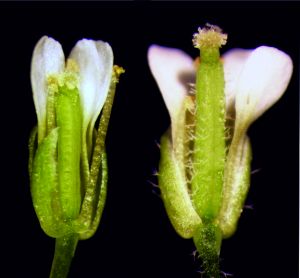Los tricomas o pelos son células epidérmicas especializadas que sirven para proteger diferentes órganos de la luz y de la pérdida de agua, así como para ser una barrera defensiva contra los insectos herbívoros. “La aparición de esta nueva característica en los frutos es un proceso complejo, que implica la combinación de mutaciones en cinco genes diferentes, a cuyas variantes naturales hemos llamado MALAMBRUNO 1-5, en referencia al personaje de Cervantes que dio barbas a la condesa y sus sirvientas en Don Quijote”, indica Alonso-Blanco, director del proyecto.
El aislamiento de los tres genes MALAMBRUNO que tienen mayor efecto ha permitido demostrar que se corresponden con factores de transcripción ya identificados dentro de la red de proteínas que regulan el desarrollo de tricomas. Noelia Arteaga, una de las investigadoras participantes del CNB-CSIC, destaca que “las plantas con mutaciones en uno o dos de estos genes ya no desarrollan tricomas en los frutos, lo que indica que es necesario que los tres genes funcionen correctamente para regular la formación de los tricomas”.
Belén Mendez de Vigo subraya “además, hemos encontramos que este nuevo carácter ha evolucionado específicamente en un antiguo linaje genético de Arabidopsis de la península ibérica, donde aparece asociado con zonas de baja precipitación en primavera”. “Estos resultados sugieren que el desarrollo de tricomas en los frutos podría estar implicado en la adaptación al clima”.
Este trabajo ha permitido conocer un nuevo mecanismo por el que algunas plantas se adaptan a los distintos climas, y esta estrategia podría aplicarse para mejorar otras plantas en el futuro.
Más información
Arteaga N, Savica M, Méndez-Vigo B, Fuster-Ponsa A, Torres-Pérez R, Oliveros JC, Picó FX, and Alonso-Blanco C. MYB Transcription Factors Drive Evolutionary Innovations in Arabidopsis Fruit Trichome Patterning. The Plant Cell 2021; 0: 1-18 doi:10.1093/plcell/koaa041






